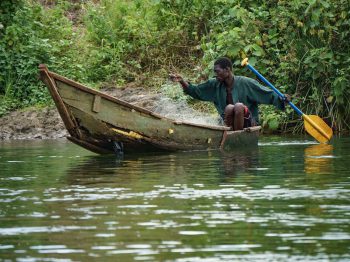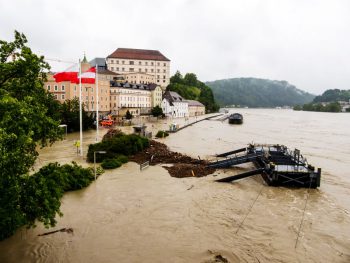Understanding ecological resilience through network science
The concept of ecological resilience, which is also a necessary condition for sustainability, was first introduced by former IIASA Director CS (Buzz) Holling in the early 1980s and has since been extensively studied by many scholars at the institute and elsewhere.
According to a new book co-written by IIASA researchers, achieving a sustainable world will require a paradigm shift in the way we approach life sciences and ecology [1]. The authors state that ‘life’ is not best viewed as a property of an organism, but should rather be seen as a property of an integrated system of organisms, ecosystems, and the biosphere. They further argue that the reductionist approach of treating life as a singular model, rather than as a system is partially responsible for the global environmental problems we face today. The book proposes six principles of holistic life science, including that it must be centered on the value of life, balance holistic and reductionist approaches, be able to model and understand complex life systems, and recommend actions for interacting with those systems.
To provide decision makers with clear indicators of resilience, IIASA researchers looked into novel network-based resilience concepts and measures from ecology that can also be applied to socioecological systems [2]. The concept of resilience actually already appears in the management principles of decision makers. A case study for the United States Bureau of Ocean Energy Management [3], for example, revealed how the bureau adopted a system that seeks to mimic and anticipate environmental change to manage for the resilience of marine ecological resources and their associated social elements. The study shows that a dynamic management framework that couples social and ecological systems can facilitate the efficient and effective utilization of resources, reduce uncertainty for decision makers, and lead to more defensible decisions on resources.
The network view on ecosystems was also innovatively used in a study aimed at understanding the use of eco-space and biodiversity [4]. The researchers looked at ecosystems in terms of the reactions that occur in response to changes in the system and then act as catalysts for other changes or interactions. They found that niche emergence, in other words, the ability of a species to evolve to adapt to their new circumstances, rather than niche partitioning where competing species use the environment differently to help them coexist, is what mostly drives ecological diversity.
Apart from engaging in research, IIASA scientists were also involved in the production of educational material for other scientists and the general public in 2018. This included editing the 2nd edition of the Encyclopedia of Ecology [5] and co-authoring several articles in Elsevier’s Reference Module in Earth Systems and Environmental Sciences, an online database containing reference articles on major concepts and notions in particular scientific areas [6, 7, 8].
References
[1] Fiscus DA & Fath B (2018). Foundations for Sustainability: A Coherent Framework of Life-Environment Relations. Academic Press.
[2] Scharler UM, Fath B, Banerjee A, Fang AD, Feng L, Mukherjee J, & Xia L (2018). Chapter 11. Resilience Measures in Ecosystems and Socioeconomic Networks. In: Systems Analysis Approach for Complex Global Challenges. Eds. Mensah, P., Katerere, D., Hachigonta, S. & Roodt, A., pp. 183-208 Heidelberg: Springer.
[3] Auad G, Blythe J, Coffman K, & Fath B (2018). A dynamic management framework for socio-ecological system stewardship: A case study for the United States Bureau of Ocean Energy Management. Journal of Environmental Management 225: 32-45.
[4] Gatti RC, Fath B, Hordijk W, Kauffman S, & Ulanowicz R (2018). Niche emergence as an autocatalytic process in the evolution of ecosystems. Journal of Theoretical Biology (In Press)
[5] Fath B (2018). Encyclopedia of Ecology 2nd Edition. Amsterdam: Elsevier.
[6] Kharrazi A (2018). Resilience. In: Reference Module in Earth Systems and Environmental Sciences.
[7] Fath B (2018). Ecosystems. In: Reference Module in Earth Systems and Environmental Sciences. pp 1125-1131
[8] Fath B & Scharler U (2018). Systems Ecology: Ecological Network Analysis. In: Reference Module in Earth Systems and Environmental Sciences. Pp. 1083-1088
Further information
Collaborators
- United States Bureau of Ocean Energy Management, US
- Beijing Normal University, China
- Western Maryland Food Council, US
- Tomsk State University, Russia
- University of Kwa-Zulu Natal, South Africa
- University of Maryland (emeritus), US
Related research





